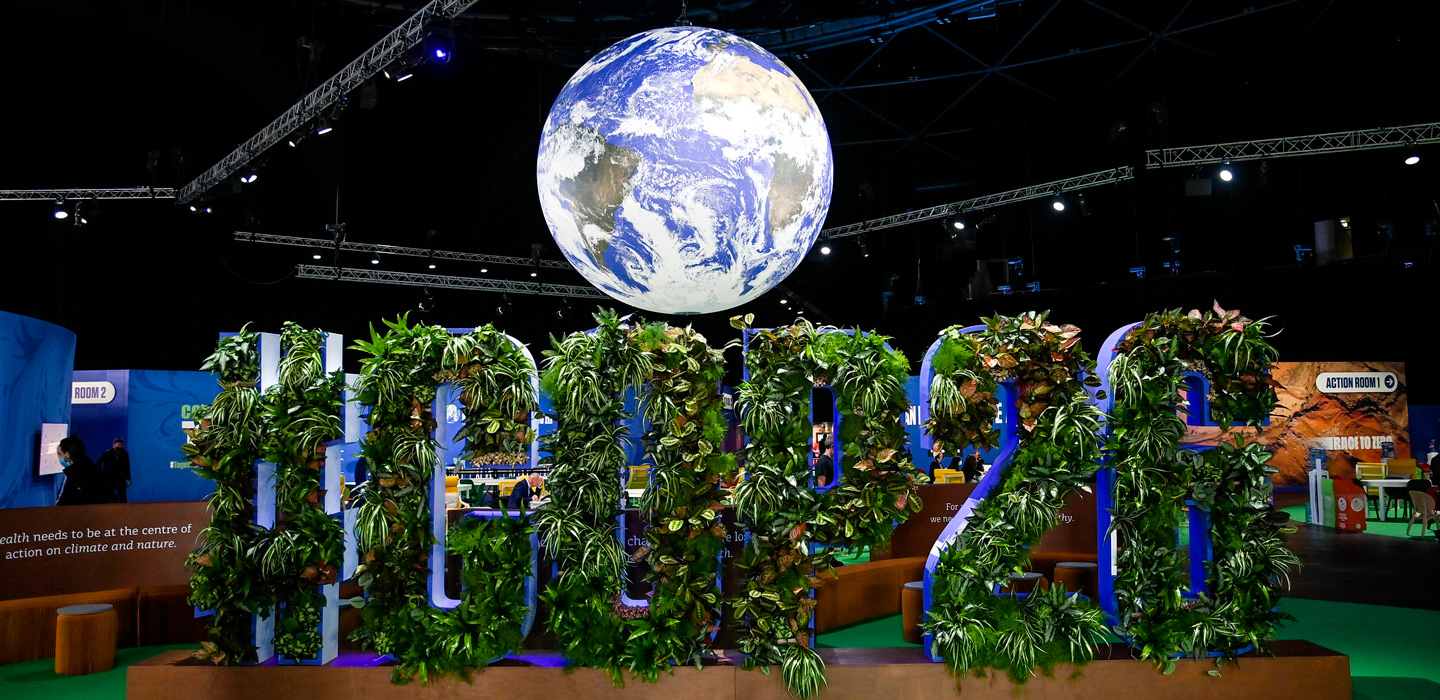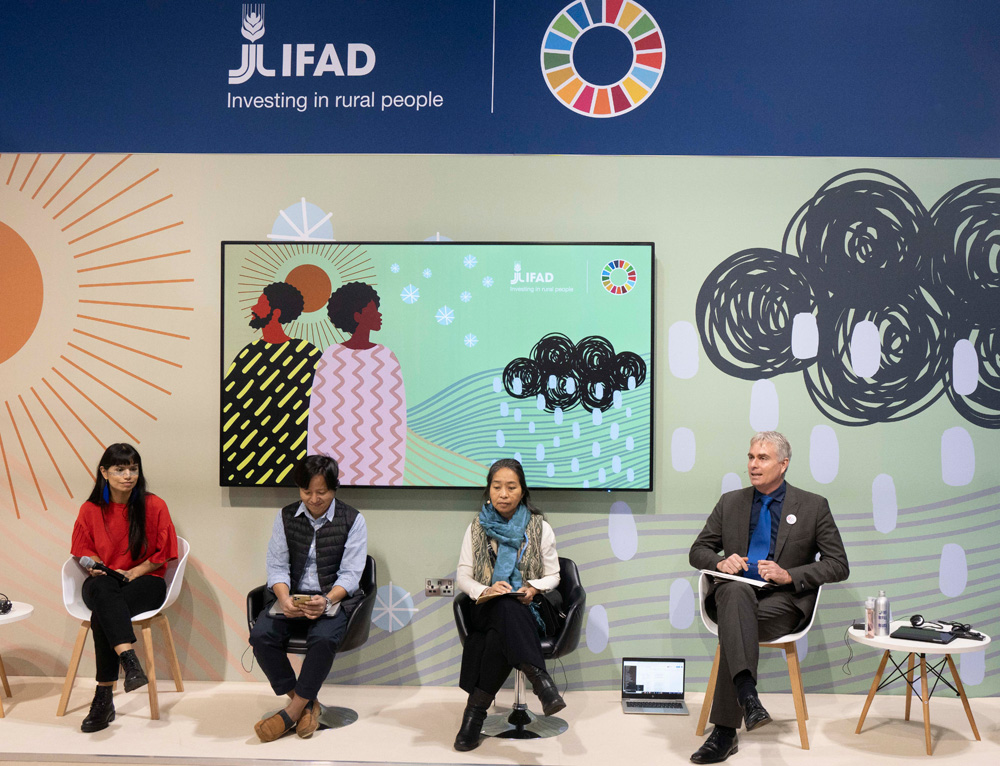Les temps forts de la COP26 – Vendredi 12 novembre 2021
IFAD Asset Request Portlet
Agrégateur de contenus
Les temps forts de la COP26 – Vendredi 12 novembre
Temps de lecture estimé: 4 minutes
La fin de la COP26 approche à grands pas, et nous attendons toujours un accord final. Cependant, sur la base des projets de textes qui ont été publiés, il est clair qu'il y a toujours un risque de décalage entre les objectifs à long terme et les actions à court terme....
Uniquement disponible en langue anglaise.
Reaching crunch time
The end of COP26 is fast approaching, and we’re still waiting for a final agreement. However, based on the draft texts that have been released, it’s clear there’s still a risk of gaps between long-term targets and short-term action.
One positive development is that adaptation has been rising up the priority list as countries come to realize its critical importance. There is also acknowledgement of the US$100 billion in annual funding needed to help poor countries adapt – an amount that rich countries had promised in the Paris Agreement but have yet to deliver. What’s more, the controversial issue of “loss and damage” – i.e., funding for rebuilding after weather events and other unavoidable climate impacts – is receiving prominence for the first time.
What’s critical in all these cases is funding. IFAD and developing countries have long been sounding the alarm on climate finance and the need to bring new and additional funds to the table. Without more funds from developed economies, it will be nearly impossible for developing countries to prepare.
As IFAD’s Goodwill Ambassador Idris Elba put it earlier in the week, “It is deeply unfair that the people who contribute so little towards climate change are bearing the brunt of it.”
❝If we don’t fix how we grow our food, and value the people who put food on our tables - the custodians of this earth - we won’t survive.❞
— International Fund for Agricultural Development (@IFAD) November 8, 2021
Powerful speech by our Goodwill Ambassadors @Sabrinadhowre and @idriselba at #COP26
Watch now. pic.twitter.com/4QTMKRJR6x
New global commitments
IFAD welcomed the new commitment by over 100 countries to halt and reverse deforestation by 2030. We’re supporting this by scaling up our investments in tree planting, nature-based solutions, restoring land, and helping the indigenous communities that act as stewards of their local ecosystems.
IFAD also welcomed the pledge to achieve a 30 per cent reduction by 2030 in emissions of methane, a short-lived but potent greenhouse gas. We’re doing our bit by helping reduce farming-related methane emissions in livestock management and rice production.
 |
| "Securing land" - Panelists speak at an IFAD Pavilion event on securing land and territorial rights. |
Updates from the IFAD Pavilion
At the IFAD Pavilion on Wednesday, we continued our efforts to make sure the voices of rural peoples are heard. Representatives of different indigenous groups spoke on the topic of how securing land and territorial rights enables climate change adaptation and resilience. Experts from IFAD and other organizations discussed concrete approaches to implementing and monitoring adaptation and resilience, and we hosted a discussion that explored whether we can have our metaphorical cake and eat it too – i.e., have both a healthy planet and well-nourished people.
On Thursday, the final day of the IFAD Pavilion, we heard about investing in the capacity of communities to experiment, learn, and innovate ways to address the effects of climate change on local agriculture. Partners from East and Southern Africa described IFAD’s experiences in driving adaptation and building resilience. Representatives of indigenous communities shared examples of how their traditional knowledge contributes to sustainable food systems. At our final event, experts explored the transition to regenerative food systems.
The end – and a beginning
COP26 is just about over, and delegates have started returning to their homes around the world. But for these delegates, and for IFAD, the real work is only just beginning.
We heard world leaders make dramatic – and not-so-dramatic – commitments. We watched as countries disagreed on where responsibility for climate change mitigation and adaptation lies, and what a fair and meaningful contribution looks like. And we at IFAD joined activists in Glasgow and billions of people around the world to clamour for decisive action and adequate, fairly allocated climate finance that reaches the people who need it most.
So now it’s time to put fine words into action.
As IFAD’s President Gilbert F. Houngbo argued at a New York Times Climate Hub debate, an ethical agricultural transition is only possible if sufficient climate finance is targeted towards helping small-scale producers adapt.
At IFAD, we have already committed half of our overall climate finance to focus on adaptation, prioritizing nature-based solutions. We have already planned to mobilize US$500 million for climate adaptation through ASAP+, and we are very grateful to have received Sweden’s additional US$11.7 million pledge to this initiative. And our new partnership with the Green Climate Fund – a US$143 million investment programme to restore the ecosystems of the Sahel – will help prevent desertification and build livelihoods for millions in West Africa.
We at IFAD will continue to invest in helping rural-dwellers adapt to a changing climate while building sustainable livelihoods.
Check out our IFAD at COP26 page to catch up on all the events of the past two weeks.
Date de publication: 12 novembre 2021